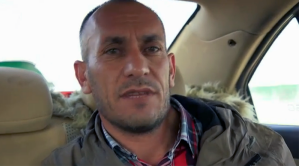It is well-known that ISIS has carried out brutal persecution tactics against Christians, Yazidis, and other minorities in Iraq and Syria, particularly on women and girls. One Yazidi man is doing his best to rescue them from ISIS control.
According to Jason M. Breslow of Frontline, former lawyer Khalil al-Dakhi had his village in northern Iraq overrun by ISIS, which carried out massacres against hundreds of Yazidi men and enslaved as many as 3,000 women and children within that community. Now he runs a secret network of contacts deep within ISIS territory that is akin to "a modern-day underground railroad."
"I have to find out where they're holding the Yazidi girls," al-Dakhi said. "We know where most of them are being held. We're even in contact with some of them."
Al-Dakhi added that he found their stories of life under ISIS brutality "hard to believe."
"Sometimes I cry," al-Dakhi quipped. "From what I've been told, four out of five of them are raped."

Breslow reported that nearly 200,000 Yazidis were forced from their homes due to fighting in Iraq and Syria. On most days, al-Dakhi shares his contact and network information in the sprawling refugee camps, gathering data on Yazidi women who escaped ISIS and who are still held by the terror group.
"Some are forced into marriages," Breslow wrote of the women under ISIS control. "Many are raped. Others are subjected to brutal deaths, such as stoning."
Even though the work is highly dangerous, al-Dakhi remains undaunted in his rescue efforts. Frontline reported that three of his men have been killed during attempted rescues.
"I can't imagine not seeing my daughter two or three times a day, talk to her, hug her," al-Dakhi said. "Now there are hundreds of children like mine who've been taken."
The director of the Frontline documentary, Edward Watts, spoke with Renee Montagne of NPR about what he observed through the actions of al-Dakhi.
"Prior to the war, he'd just been a small-town lawyer dealing with marriages, divorces, deaths - those kind of things," Watts said of al-Dakhi. "But in the aftermath of this cataclysm that hit their community, he began to gather testimony, firstly of people who had suffered from the simple military attack."
According to Watts, al-Dakhi managed to find a sort of blueprint for rescuing people held captive by ISIS through the testimony of women and children who managed to escape from their territory. The Yazidi man held out hope that there would be a war crimes trial one day.
"What he realized looking at this testimony was that the women were coming back with extraordinarily detailed information about the disposition of the Islamic State," Watts said. "So where there were checkpoints, where there were sort of fortified headquarters and, most importantly for him, where the Yazidi hostages were being held."
Montagne pointed out that some of the Yazidi women managed to hide cell phones and call out for help. She asked Watts if any ransoms were paid to secure their release.
"The majority of the money is going to the people who are actually involved in doing the rescues," Watts said. "So some people, I was told, they're doing it for free because of simple humanitarian reasons. Others are doing it because of poverty."
Watts emphasized that none of the money went to ISIS directly, given the terror group's infamous reputation in the region. They even set up ambushes to trap the rescuers; two of al-Dakhi's men died in an ambush conducted by ISIS.
"They got a girl to call the rescue network saying her captor was away at the frontline and therefore, she was, in a sense, in a position to be rescued," Watts said of al-Dakhi's men. "They sent two of their guys in. ISIS were waiting for them, captured them and executed them."
According to Watts, one Yazidi girl managed to escape with a stolen phone that had a video clip of ISIS fighters making crude jokes and conducting transactions for sabia, the term they used for sex slaves.
"Unlike most of their output, this was not intended for public consumption," Watts said. "I think it just really gives you an idea of the callous brutality with which they were treating these very young and fragile and vulnerable women and girls because for them, they were slaves, and slaves could be bought and sold and treated entirely as they pleased."
Watts noted that before ISIS disrupted their lives, the Yazidi community took a highly conservative view on all things related to sex as recently as a few years ago; any Yazidi woman who ran off with a Muslim man could be subjected to an honor killing. However, the sexual violence used against them has changed the community's conservative nature on that topic.
"Their religious leaders have actually been at the forefront of this from very early on in the process saying we have to welcome our girls back," Watts said. "We need to do whatever it takes to reintegrate them and make them feel at home once again in our community. And I think that certainly that what I saw was that the community [was] very much responding to those calls."
Viewers can watch the Frontline documentary "Escaping ISIS" in its entirety on the PBS website.







